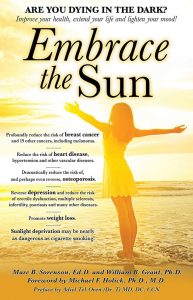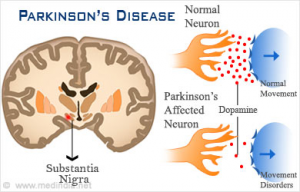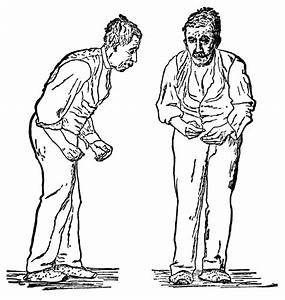 Parkinson’s disease prevented by sunlight. By Marc Sorenson, EdD
Parkinson’s disease prevented by sunlight. By Marc Sorenson, EdD
 Parkinson’s disease is a common nerve disease, and it is caused by deterioration of brain cells that produce dopamine. It is characterized by tremors, muscle rigidity, shuffling gait, slow speech, and a mask-like facial expression. In addition, even simple movements may become difficult for the person suffering from the disease. And, the disease is a killer that takes the lives of 14,593 per year.[1] So how do we prevent it? In this blog, I will explain the disease, show what the research says about sunlight, and make recommendations for prevention.
Parkinson’s disease is a common nerve disease, and it is caused by deterioration of brain cells that produce dopamine. It is characterized by tremors, muscle rigidity, shuffling gait, slow speech, and a mask-like facial expression. In addition, even simple movements may become difficult for the person suffering from the disease. And, the disease is a killer that takes the lives of 14,593 per year.[1] So how do we prevent it? In this blog, I will explain the disease, show what the research says about sunlight, and make recommendations for prevention.
Research points out that Sun exposure is the key to prevention of Parkinson’s disease.
Several studies have shown that there is a close association between sunlight exposure, blood  vitamin D levels and Parkinson’s. First of all, one paper showed that when vitamin D levels are low, there is a tripling of the risk.[2] Another study from China demonstrated that persons with highest levels of blood vitamin D had a 48% decrease in risk. And, that same research demonstrated that those receiving the greatest sun exposure had about a 47% decrease in risk.[3] So, based on those findings, one might think that vitamin D supplements could prevent the disease. Yet, that thought is erroneous. Sun exposure is the direct key for preventing this debilitating disease.
vitamin D levels and Parkinson’s. First of all, one paper showed that when vitamin D levels are low, there is a tripling of the risk.[2] Another study from China demonstrated that persons with highest levels of blood vitamin D had a 48% decrease in risk. And, that same research demonstrated that those receiving the greatest sun exposure had about a 47% decrease in risk.[3] So, based on those findings, one might think that vitamin D supplements could prevent the disease. Yet, that thought is erroneous. Sun exposure is the direct key for preventing this debilitating disease.
Vitamin D supplements do not stop Parkinson’s, so how can that be?
Recent research, a systematic review and meta-analysis, is most noteworthy. And it explains this interesting paradox.[4] It showed that sun exposure was significantly associated with a reduced risk of Parkinson’s. Especially relevant is the fact that those persons with plenty of sun exposure had only 1/50 the risk of Parkinson’s. That is an astounding figure! However, although vitamin D supplements were effective in raising vitamin D levels, they had no significant benefits for Parkinson’s disease.
Vitamin D and sun exposure are not the same.
While sun exposure and supplements both raise vitamin D levels, supplements are no help to Parkinson’s sufferers. Hence, we must look beyond vitamin D for an answer. Sun exposure leads to the production of vitamin D, but it also leads to the production of dopamine. Dopamine, as previously mentioned, is a vital chemical for the brain as regards Parkinson’s. Vitamin D is a marvelous, vital photoproduct and is due to sun exposure. It is vital for human health. However, it appears that vitamin D does nothing for Parkinson’s. Most of all, we must remember that sun exposure produces many essential photoproducts beyond vitamin D.
Vitamin D blood levels, in the case of Parkinson’s and some other diseases, are simply surrogate measurements of sun exposure. We simply cannot substitute a vitamin D pill for sun exposure and expect to reap all the benefits of sunlight. The “holistic” sun will never be supplanted by a capsule. The sun stimulates the production of vitamin D, dopamine, nitric oxide, serotonin, endorphins, brain-derived neurotropic factor (BDNF) and other photoproducts. And, all of these photoproducts play their roles in human health. For some diseases, vitamin D is vital for prevention. In others such as Parkinson’s, it is just along for the ride.
The takeaway regarding sun exposure and Parkinson’s.
To help prevent this disease, be sure to obtain plenty of non-burning sunlight. And In lieu of that, when there is no sunlight available, use a low-pressure sunbed (tanning bed) in a salon. Always remember not to burn. For more information, read my new book, Embrace the Sun, available at Amazon: https://www.amazon.com/Embrace-Sun-Marc-B-Sorenson/dp/069207600X 
Happy sunning!
[1] ttps://www.rightdiagnosis.com/p/parkinsons_disease/deaths.htm
[2] Knekt P, Kilkkinen A, Rissanen H, Marniemi J, Sääksjärvi K, Heliövaara M. Serum vitamin D and the risk of Parkinson disease. Arch Neurol. 2010 Jul;67(7):808-11.
[3] Wang J, Yang D, Yu Y, Shao G. Wang Q. Vitamin D and Sunlight Exposure in Newly-Diagnosed Parkinson’s Disease. Nutrients 2016;8:142.
[4] Zhou Z, Zhou R, Zhang Z, Li K. The Association between Vitamin D Status, Vitamin D Supplementation, Sunlight Exposure, and Parkinson’s disease: A Systematic Review and Meta-Analysis. Med Sci Monit. 2019 Jan 23;25:666-674.
 Although liver cancer is generally thought to be related to drinking, other factor such as obesity, HIV infection, smoking, diabetes, socioeconomic factors, drugs and others come into play. A recent study compared sun exposure to liver cancer and adjusted for the aforementioned factors. Sun exposure was shown to be a major factor in reducing the risk of the most prevalent and deadly liver cancer, called hepatocellular carcinoma.[1]
Although liver cancer is generally thought to be related to drinking, other factor such as obesity, HIV infection, smoking, diabetes, socioeconomic factors, drugs and others come into play. A recent study compared sun exposure to liver cancer and adjusted for the aforementioned factors. Sun exposure was shown to be a major factor in reducing the risk of the most prevalent and deadly liver cancer, called hepatocellular carcinoma.[1]
Major finding for liver cancer:
The subjects were divided into five groups, or quintiles, based on their sun exposure. In addition such factors as as outdoor activity, geographical residence, urban or rural settings, etc. were adjusted for.
Most noteworthy, was the fact that for each quintile of increasing sun exposure, there was a 17% decrease in the liver cancer risk.
A disappointment:
The only disappointing part to the study was this: The researchers assumed that the positive influence of sun exposure on liver cancer was due to vitamin D production. And, they may have been correct. Yet the sun causes the body to produce many other photoproducts. Due to the sun’s myriad effects, serotonin, endorphin, BDNF, nitric oxide, and dopamine are all increased. Therefore, it is impossible to know if vitamin D alone was the reason for the reduced risk of liver cancer. However, vitamin D undoubtedly played a large part in the positive results. And, there is a problem with giving vitamin D the credit without knowing for sure. People may believe, due to this research, that they need only to take a vitamin D supplement to receive all benefits of sunlight. Therefore, they can make very bad assumptions.
This is the first study on sun exposure and liver cancer.
Probably, this is the first research to show a link between liver cancer and inadequate sun exposure. However, there are indications that sun exposure is associated with a reduced risk of another liver ailment, called fatty liver disease.[2]
In conclusion, if you are a liver lover, you can love your liver by protecting it from liver cancer. Hence, you should obtain your share of unscreened, direct, non-burning sun exposure. Happy sunning!
[1] Trang VoPham, Kimberly A. Bertrand, Jian-Min Yuan, Rulla M. Tamimi, Jaime E. Hart,
and Francine Laden. Ambient ultraviolet radiation exposure and hepatocellular carcinoma incidence in the United States. Environmental Health (2017) 16:89.
[2] Gorman S, Black LJ, Feelisch M, Hart PH, Weller R. Can skin exposure to sun prevent liver inflammation? Nutrients 2015 May 5;7(5):3219-39.
A recent sunshine article in the UK online newspaper, The Mail, led with the headline, “Sunshine breaks could mean better mental health.” It then went on to describe how many shift workers, as well as other residents of the UK, are deficient in vitamin D.[1] Quoting from research published in the Journal BMC Public Health,[2] the article stated that about 91% of residents are at least insufficient in vitamin D.
Vitamin D deficiency of that extent is a health crisis, of that there is no doubt. It is also a surety that the way to combat vitamin D deficiency is by taking “sunshine breaks.” However, it is misleading to assume it is vitamin D deficiency that is responsible for the entire problem with mental health and other diseases as they relate to sun exposure. Consider the fact that lack of sunshine deficiency also causes problems beyond vitamin D deficiency. For example, the natural 24-hour cycles, called circadian rhythms, are desynchronized by lack of sunshine in the morning. This causes us to feel out of synch and to be more susceptible to many diseases including cancer.
Remember that sun exposure also leads to the production of serotonin,[3] endorphin,[4] dopamine,[5] and BDNF,[6] all of which have a positive effect on mood and mental health.
Sunshine is vital to mental and physical health, and that health is not due to vitamin D alone. Take a holistic view of the importance of sunshine.
[1] http://www.nwemail.co.uk/news/Sunshine-breaks-could-mean-better-mental-health-88b00574-032c-4467-846c-1eff0514d4e8-ds
[2] Sowah D, Fan X, Dennett L, Hagtvedt R, Straube S. Vitamin D levels and deficiency with different occupations: a systematic review. BMC Public Health. 2017 Jun 22;17(1):519.
[3] Lambert GW, Reid C, Kaye DM, Jennings GL, Esler MD. Effect of sun and season on serotonin turnover in the brain. Lancet. 2002 Dec 7;360(9348):1840-2.
[4] Asta Juzeniene and Johan Moan. Beneficial effects of UV radiation other than via vitamin D production: Dermato-End Holick, M. The UV Advantage 2. Ibooks 2003, New York. Ocrinology 2012;4(2):109–117.
[5] Holick, M. The UV Advantage 2. Ibooks 2003, New York.
[6] Molendijk ML, Haffmans JP, Bus BA, Spinhoven P, Penninx BW, Prickaerts J, Oude Voshaar RC, Elzinga BM. Serum BDNF concentrations show strong seasonal variation and correlations with the amount of ambient sun. PLoS One. 2012;7(11):e48046.
By Marc Sorenson, EdD, Sunlight Institute…
A recent post by an online paper called The Korea Bizwire talks of research by Dr. Emad Al Duzahiri, in which he concludes that those who are suffering from chronic fatigue may really be suffering from sun deficiency.[1] The article mentions that vitamin D, preferably from sun exposure, is essential for reducing the risk of the disease.
There is at least one additional study indicating that optimization of vitamin D improves the severity of symptoms in those who suffer from fatigue.[2]
Remember that sun exposure is the best way to obtain your vitamin D, because it also comes along with serotonin, nitric oxide, endorphins and perhaps dopamine, and it profoundly improves the mood—just what the doctor ordered for chronic fatigue.
So when your get-up-and-go has gotten up and gone, don’t forget the sun!
[1] Emad Al Duzahiri. Quoted in The Korea Bizwire, January 19, 2016. http://koreabizwire.com/lack-of-exposure-to-sunlight-may-lead-to-chronic-fatigue/48480 (accessed January 20, 2016)
[2] Roy S, Sherman A, Monari-Sparks MJ, Schweiker O, Hunter K. Correction of Low Vitamin D Improves Fatigue: Effect of Correction of Low Vitamin D in Fatigue Study (EViDiF Study). N Am J Med Sci. 2014 Aug;6(8):396-402.
